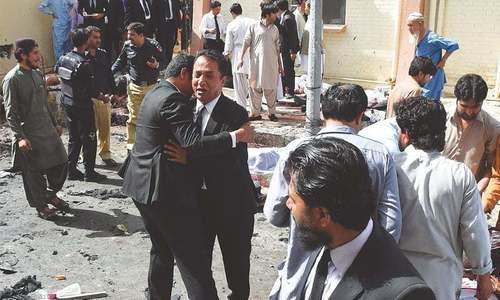
TAMANNA wanted to be a photographer since she was a child. While her schoolmates dreamed about becoming doctors, engineers, or teachers, the now 18-year-old matric student hoped that she would, one day, open her own photography studio.
I walked into the offices of Lala Zar Production in Hazara Town and was greeted at the entrance by one of Tamanna’s colleagues. She led me into the premises, where other colleagues sat busy in their work, and introduced me to the photographer who had founded the studio.
Explore: These Hazara girls are breaking the mould with martial arts
At first, it is hard to picture the diminutive teenager as the proprietor of a professional studio, but as Tamanna starts talking about her hopes about empowering the women of Hazara Town and sharing her talents with them, her passion for the craft shines through.
The young photographer is from a well-educated and enlightened Hazara family, but the community she hails from, like all other communities in Quetta, is quite conservative. It is not common for Hazara women to work outside their homes but this is primarily what makes Tamanna stand out. Her parents have been instrumental in her success, in that they encouraged her to follow her dreams and helped her realise them too.
Tamanna tells Dawn that her mother runs an institute of handicrafts, and has been a great source of inspiration for her. Her father is a businessman, and her mother had wanted to open an institute of handicrafts because she wanted to be independent. “I founded the studio in order to bring together girls who live in our town, and who have a penchant for photography and videography,” she says.
Tamanna also teaches a five-month-long course to young women like her, who want to learn and polish their photography skills. However, she shares that her hopes of empowerment may not be welcomed by many. “This is why we have around half-a-dozen students, who come here to learn and train,” she laments, adding: “Those who do attend are passionate about their craft and join us readily... But unfortunately, they also share with us that their parents pressure them to do something ‘better’ instead of wasting their time in our studio.”
The Hazara community in Quetta has been a target of unrelenting sectarian violence for the past several years. A Dawn report published a few days ago said that 509 Hazaras were killed and 627 were injured in various incidents over the last five years. Tamanna wants to tell her community’s stories of suffering and women’s struggles for empowerment through short films. “I am working on a short movie, in which I would like to show how Hazara women can overcome challenges especially those, whose loved ones and husbands have been killed in sectarian attacks,” she says.
Outside of Balochistan, the Hazara community is usually associated with security concerns and perhaps this is the reason why positive and inspiring stories about the community rarely make it to the mainstream media. Tamanna says, “We want to show our countrymen the positive side of our people by our photo-videography. There is a lot of stories in our town that need to be unearthed. The purpose of our job is to try to divert people’s attention from violence, which has affected our people, to the positive side of our people. For instance, we are going to make short movies on true stories that impact our society.”
The team of young photographers have also found a ready market in their community. Humera Hazara, one of Tamanna’s colleagues, says that usually conservative families do not allow men to photograph women relatives at weddings. “But ever since we launched our studio, people call us to take pictures of them at their weddings,” she says.
In her struggles to create something meaningful for young photography enthusiasts like herself, Tamanna’s family has stood by her like a rock. Her elder brother Ahmad Javed says, “Why would we oppose her efforts to be what she wants to become? It is her choice and she is helping other girls of her age to stand up on their own feet... For instance, if we cannot help our sisters realise their professional ambitions and goals, the least we can do is not to oppose them.”
It is then a sad state of affairs that ambitious and skilled entrepreneurs like Tamanna cannot hope for help from the government or authorities in Balochistan. And yet, it is the inefficiency and negligence of the authorities that gives young women like Tamanna the spark to take matters into their own hands.
“At this point, we are not thinking about whether the government or NGOs will help us out in our initiatives or not... Instead of buying new and expensive clothes, we buy equipment for our studio,” Tamanna insists. “We are hopeful that we will continue doing so ahead, and we will succeed in our future endeavours.”
Published in Dawn, March 24th, 2018
















































